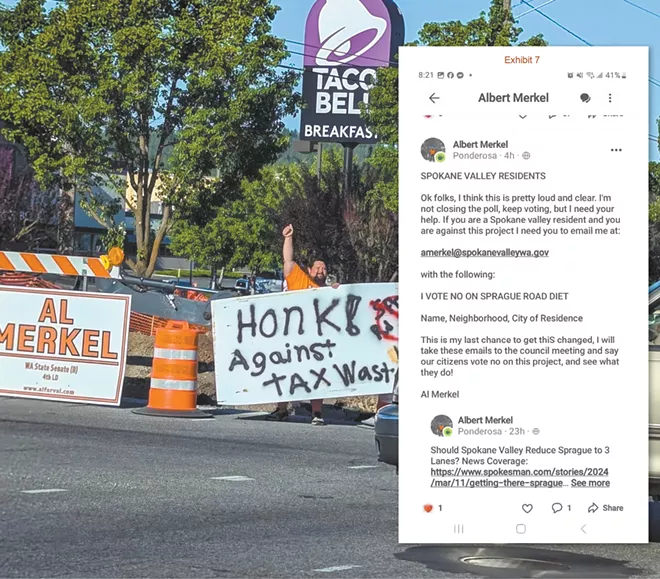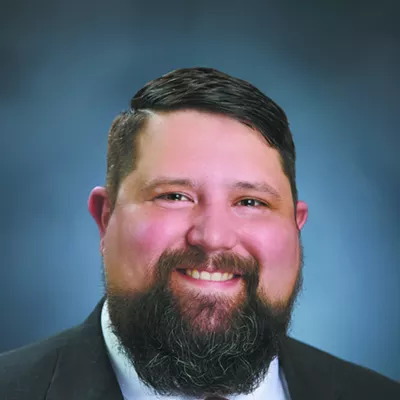
In June, Spokane Valley City Council member Jessica Yaeger filed a complaint against fellow Council member Al Merkel, alleging that he violated Washington's public records law and the city's social media policy.
The city hired Seattle attorney Rebecca Dean to investigate the matter shortly after the complaint. Last week, Dean provided the city with a report concluding that "some" of the posts Merkel made on his personal Nextdoor social media account "are more likely than not" public records that aren't currently retained by the city.
The Sept. 3 report also found that Merkel refused to cooperate with the city's request to produce the Nextdoor posts, which probably violated the state's Public Records Act.
Additionally, the report concluded that Merkel violated the City of Spokane Valley's social media policy for council members, which can be found in a governance manual that was updated in December.
The city's governance manual states that personal and campaign social media accounts should use a personal email, not one related to the city. Additionally, personal social media accounts require a disclaimer, and posts about the conduct of city government or related to the performance of the office should not be made on personal accounts.
Merkel's Nextdoor posts often include summaries of City Council debates and his personal commentary criticizing the actions of other council members. Sometimes he conducts polls about actions he should take as a council member and refers people to his government email account.
Yaeger and Merkel were elected on Nov. 3, 2023, and received training for newly elected officials from the Association of Washington Cities. Deputy City Manager Erik Lamb says that new council members also receive an orientation before their first day of office and additional training afterward.
"We provide annual training to council members on open government laws, including the Public Records Act and the Open Public Meetings Act," Lamb says. "Our city attorney also provided that training early in the year after they were in office."
The city's governance manual provides a pathway for council members to engage with their constituents through social media. The policy requires them to use Pagefreezer, a software that can archive online conversations and social media activity on official accounts to comply with Freedom of Information Act requirements and the Public Records Act.
However, Merkel doesn't think he should have to use the software for his personal Nextdoor account, which he says is tied to his campaign email, and can't be connected to a different email.
"There's not a way to change that in Nextdoor," Merkel says.
Lamb says he's proud of the city's ability to abide by state open government laws and remain accountable through transparency. He hopes that council members will follow the policy moving forward.
"We are hopeful that Council member Merkel will abide by the policy and state law," Lamb says. "There is a means for him to communicate with his constituents under the policy and the city to be able to comply with the Public Records Act, and we hope he's able and willing to do that and reduce unnecessary legal and financial risk to the city."
Merkel says he has used the Nextdoor app since before he was elected to the City Council and sees it as a valuable tool for communicating with his constituents. He says people who comment and post must disclose their residency to the app, making it clear where they live.
"What's really nice about that is when you're having conversations with people online, you know whether they're Valley residents or not Valley residents," Merkel says. "That's not the case on something like Facebook."
Constituents prefer using popular apps like Nextdoor, Merkel argues. He says that the whole investigation was "political theater" and just a "farce" costing the city and taxpayers money by hiring a "high-priced" Seattle lawyer to attack him.
However, Council member Yaeger points out that she is in the same political party as Merkel. She reiterates that Merkel, like every member of the City Council, has a responsibility to follow the policy.
"You're supposed to follow the rules set forth and the laws of the state of Washington and follow the governance manual," Yaeger says. "This is nothing personal against him."
Merkel says the report was simply the opinion of a third-party attorney and that using the word "likely" doesn't meet the constitutional standard of beyond a reasonable doubt.
"This is an opinion based on some consultant just giving their opinion," Merkel says. "My lawyer has a different opinion, but this is not how the legal system works."
Council member Yaeger says it's easy to review the manual and determine whether you're complying with the oath of office as an elected official.
"In December of 2023, the council passed Appendix H, and we took our oath of office knowing what the governance manual said," Yaeger says.
In a somewhat related U.S. Supreme Court decision in March, Lindke v. Freed, a two-part test was created to determine if social media posts by a government official are personal in nature, and whether that official can delete comments from other users without violating the First Amendment. First, it must be determined whether the official had the authority to speak on the government's behalf and was purported to do so on a social media account. Second, it must be determined if the official stated an intent to exercise their authority. Both components must be met before finding them in violation.
The court also said that if a public official includes "a disclaimer (e.g., 'the views expressed are strictly my own'), he would be entitled to a heavy (though not irrebuttable) presumption that all of the posts on his page were personal."
Merkel's posts sometimes include a disclaimer noting that "nothing in this post is meant to reflect the view of the city or the council as a whole." At times he specifically asks for feedback to take to the council before a vote.
Merkel has until Sept. 13 to submit an appeal to the hearing examiner. After an appeal, the council may take further action, such as a verbal reprimand, public censure or removal from committees. ♦

























